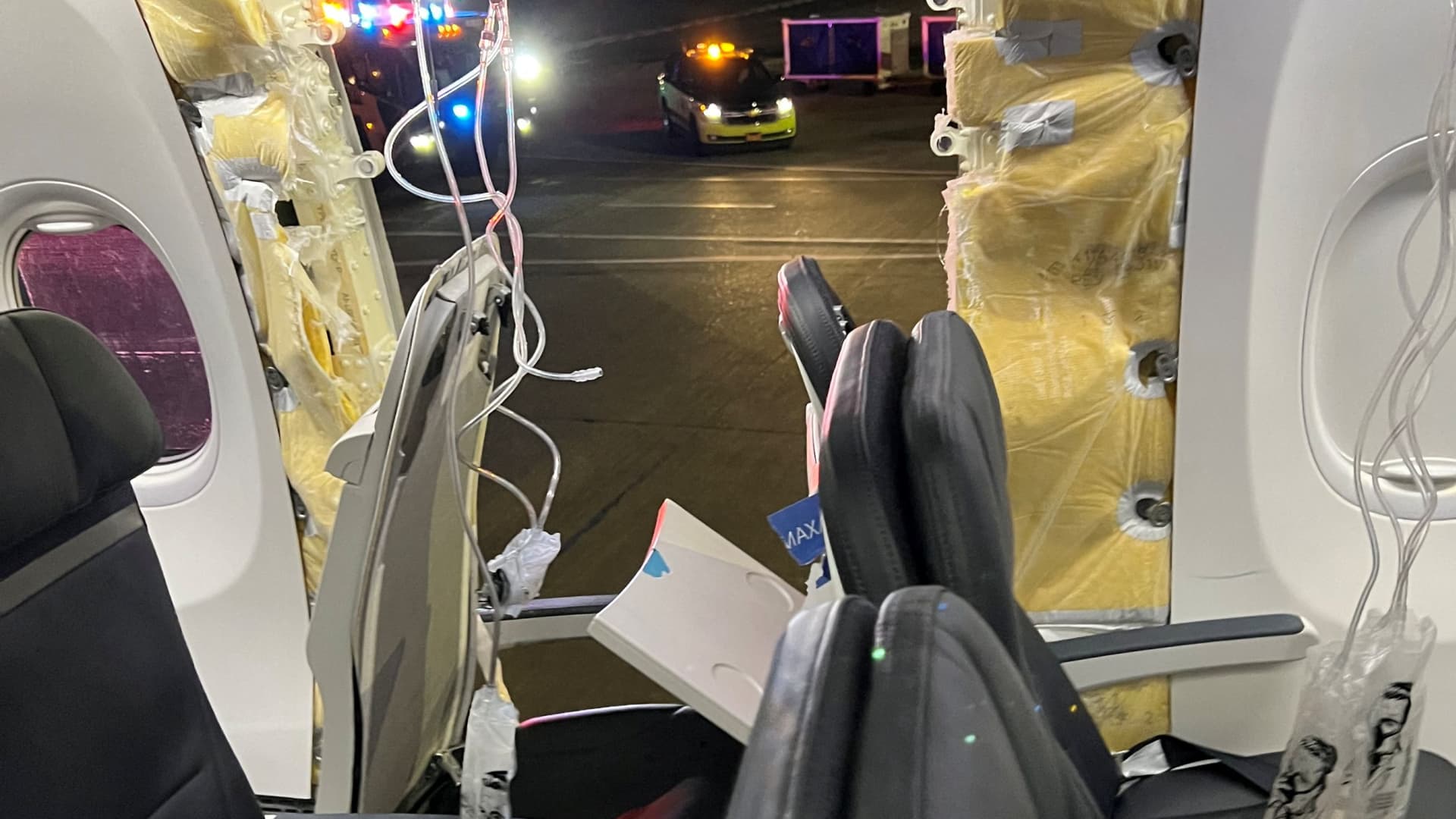Passenger oxygen masks hang from the roof next to a missing window and a portion of a side wall of an Alaska Airlines Flight 1282, which had been bound for Ontario, California and suffered depressurization soon after departing, in Portland, Oregon, U.S., on Jan. 5, 2024, in this picture obtained from social media.
Instagram/@strawberrvy | Instagram/@strawberrvy Via Reute
The Federal Aviation Administration on Saturday ordered airlines to ground more than 170 Boeing 737 Max 9 aircraft for inspections, a day after after a panel on one blew out in the middle of an Alaska Airlines flight.
The emergency airworthiness directive will affect about 171 planes worldwide and applies to U.S. airlines and carriers operating in U.S. territory.
Alaska Airlines Flight 1282 was bound for Ontario, California when it returned to Portland, Oregon shortly after takeoff on Friday after a pressurization issue was detected. No serious injuries were reported on the flight, according to federal safety officials. The flight returned to Portland, Oregon, shortly after takeoff on Friday after a pressurization issue was reported.
Images and video of Alaska’s Boeing 737 Max 9 shared on social media showed a gaping hole on the side of the plane and passengers using oxygen masks before it returned to Portland.
“Safety will continue to drive our decision-making as we assist the NTSB’s investigation into Alaska Airlines Flight 1282,” FAA Administrator Mike Whitaker said in a statement.
The incident was described as “an explosive decompression at the window exit,” said Sara Nelson, president of the Association of Flight Attendants-CWA, the labor union that represents Alaska’s cabin crew and flight attendants at United, Spirit and other carriers.
Anthony Brickhouse, a professor of aerospace safety at Embry-Riddle Aeronautical University, said such an incident is extremely rare.
“Rapid decompression is a serious matter,” he said. “To see a gaping hole in an aircraft is not something we typically see. In aviation safety, we would call this a structural failure.”
Alaska Airlines overnight said it would ground its fleet of Boeing 737 Max 9 planes. Alaska said on Saturday morning, local time, that it had completed inspections on more than a quarter of its 737 Max 9 fleet “with no concerning findings.”
“Aircraft will return to service as their inspections are completed with our full confidence,” the Seattle-based airline said.
More than 100 flights, about 14% of Alaska’s schedule, were canceled on Saturday, according to FlightAware.
Investigation begins
The National Transportation Safety Board sent a team to Portland on Saturday to investigate the incident.
United Airlines, the largest operator of the planes in the U.S., was preparing to ground dozens of its Boeing 737 Max 9 aircraft for inspections, CNBC reported earlier Saturday.
United has 79 Boeing 737 Max 9 aircraft in its fleet but just over 30 of them have already “received the necessary inspection that is required by the FAA,” the airline said. The inspections were expected to cause about 60 flight cancellations on Saturday, United said.
United has close to 80 of the planes in its fleet, though some of the jets have recently undergone in-depth, routine inspections.
The FAA said the inspections will take between four and eight hours per plane, the agency said.
The Boeing 737 Max 9 is a larger version of Boeing’s best-selling jetliner, the 737 Max 8. Max planes were grounded worldwide in 2019 after two fatal crashes within about five months of one another. The U.S. lifted its flight ban of the jets in late 2020 after software and training updates.
Large-scale groundings of aircraft by the FAA or other aviation authorities are rare.
The Boeing 737 Max 9 has an emergency exit door cut behind the wings for use in dense seating cabin configurations, like those used by budget airlines, according to Flightradar24.
“The doors are not activated on Alaska Airlines aircraft and are permanently ‘plugged,'” Flightradar24 said.
Boeing didn’t to comment beyond its statement when asked about the sealed emergency exit door. Spirit AeroSystems, which makes the fuselages for the planes, referred CNBC to Boeing when asked about the incident.
“Safety is our top priority and we deeply regret the impact this event has had on our customers and their passengers,” Boeing said in a statement on Saturday. “We agree with and fully support the FAA’s decision to require immediate inspections of 737-9 airplanes with the same configuration as the affected airplane.”
The company said it is supporting the NTSB’s investigation.
There are 215 Boeing 737 Max 9 planes in service worldwide, according to aviation-data firm Cirium. In addition to United and Alaska Air, other operators include Aeromexico, Turkish Airlines, Icelandair and Panama’s Copa Airlines.
Southwest Airlines and American Airlines operate the smaller 737 Max 8.
Late last year, Boeing urged airlines to inspect aircraft for a “possible” loose bolt in the rudder control system, the latest in a series of manufacturing flaws on Boeing jets that have prompted additional inspections.

